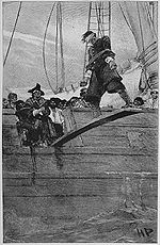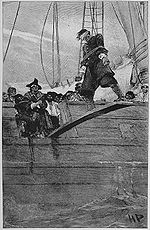
Walking the plank
Encyclopedia

Seafarers
Seafarers can refer to ethnic groups living by the sea in Southeast Asia, and also other sea-living ethnic groups in the world. The ethnic group name refers to a large distribution area, reaching from the islands of Indonesia to Burma...
. The victim was forced to walk off the end of a wooden plank or beam, the final six feet of which extended over the side of a ship
Ship
Since the end of the age of sail a ship has been any large buoyant marine vessel. Ships are generally distinguished from boats based on size and cargo or passenger capacity. Ships are used on lakes, seas, and rivers for a variety of activities, such as the transport of people or goods, fishing,...
. The victim, sometimes with hands bound or weighed down, then drowns in the water or killed by shark
Shark
Sharks are a type of fish with a full cartilaginous skeleton and a highly streamlined body. The earliest known sharks date from more than 420 million years ago....
s (which would often follow ships). The earliest known use of the phrase is the latter half of the 18th century. Some writers in the 20th century speculated that walking the plank may be a myth created by cinema; however, the phrase "walking the plank" is recorded in English
England
England is a country that is part of the United Kingdom. It shares land borders with Scotland to the north and Wales to the west; the Irish Sea is to the north west, the Celtic Sea to the south west, with the North Sea to the east and the English Channel to the south separating it from continental...
writer Francis Grose
Francis Grose
Francis Grose was an English antiquary, draughtsman, and lexicographer. He was born at his father's house in Broad Street, St-Peter-le-Poer, London, son of a Swiss immigrant and jeweller, Francis Jacob Grose , and his wife, Anne , daughter of Thomas Bennett of Greenford in Middlesex...
's "Dictionary of the Vulgar Tongue", which was published in 1788 (first published in 1785).
Historical instances of plank walking
In 1769, mutineerMutiny
Mutiny is a conspiracy among members of a group of similarly situated individuals to openly oppose, change or overthrow an authority to which they are subject...
George Wood confessed to his chaplain at Newgate Prison
Newgate Prison
Newgate Prison was a prison in London, at the corner of Newgate Street and Old Bailey just inside the City of London. It was originally located at the site of a gate in the Roman London Wall. The gate/prison was rebuilt in the 12th century, and demolished in 1777...
that he and his fellow mutineers had sent their officers to walk the plank.
In July 1822, William Smith, captain of the British sloop
Sloop
A sloop is a sail boat with a fore-and-aft rig and a single mast farther forward than the mast of a cutter....
Blessing, was forced to walk the plank by the Spanish pirate crew of the schooner
Schooner
A schooner is a type of sailing vessel characterized by the use of fore-and-aft sails on two or more masts with the forward mast being no taller than the rear masts....
Emanuel in the West Indies.
The Times
The Times
The Times is a British daily national newspaper, first published in London in 1785 under the title The Daily Universal Register . The Times and its sister paper The Sunday Times are published by Times Newspapers Limited, a subsidiary since 1981 of News International...
reported on February 14, 1829 that the packet Redpole (Bullock, master) was captured by the pirate schooner
Schooner
A schooner is a type of sailing vessel characterized by the use of fore-and-aft sails on two or more masts with the forward mast being no taller than the rear masts....
President and sunk. The commander was shot and the crew were made to walk the plank.
In 1829, pirates intercepted the Dutch
Netherlands
The Netherlands is a constituent country of the Kingdom of the Netherlands, located mainly in North-West Europe and with several islands in the Caribbean. Mainland Netherlands borders the North Sea to the north and west, Belgium to the south, and Germany to the east, and shares maritime borders...
brig
Brig
A brig is a sailing vessel with two square-rigged masts. During the Age of Sail, brigs were seen as fast and manoeuvrable and were used as both naval warships and merchant vessels. They were especially popular in the 18th and early 19th centuries...
Vhan Fredericka in the Leeward Passage
Leeward Passage
The Leeward Passage is a channel between Hans Lollik Island and northern St. Thomas Island in the United States Virgin Islands in the West Indies.-References:...
between the Virgin Islands
Virgin Islands
The Virgin Islands are the western island group of the Leeward Islands, which are the northern part of the Lesser Antilles, which form the border between the Caribbean Sea and the Atlantic Ocean...
, and murdered most of the crew by making them walk the plank with cannonballs tied to their feet.
It was said that forcing loyal seamen to walk the plank was supposed, by the perpetrators, to "avoid the penalty for murder" (by not actually killing the victims), but this would hardly have worked. Not only would most lawmen not have hesitated to prosecute any person who forced another to his death, but piracy
Piracy
Piracy is an act of robbery or criminal violence at sea. The term can include acts committed on land, in the air, or in other major bodies of water or on a shore. It does not normally include crimes committed against persons traveling on the same vessel as the perpetrator...
and mutiny
Mutiny
Mutiny is a conspiracy among members of a group of similarly situated individuals to openly oppose, change or overthrow an authority to which they are subject...
were also capital crimes. However, a plank-walking may have been easier on the perpetrators' consciences.
Although walking the plank plays a large role in contemporary pirate lore
Pirates in popular culture
In American and British popular culture, the modern pirate stereotype owes its tradition mostly to depictions of Captain Hook and his crew in theatrical and film versions of Peter Pan, Robert Newton's portrayal of Long John Silver in the film Treasure Island, and various adaptations of Sinbad the...
, in reality walking the plank was a very rare phenomenon. Most pirates, mutineers, etc., would not bother with such an elaborate means of doing away with their captives. The few who particularly enjoyed torturing their victims (such as Edward Low) would probably have used longer-lasting methods.
See also
- West Indies SquadronWest Indies Squadron (United States)The West Indies Squadron, or the West Indies Station, was a United States Navy squadron that operated in the West Indies in the early nineteenth century. It was formed due to the need to suppress piracy in the Caribbean Sea, the Antilles and the Gulf of Mexico region of the Atlantic Ocean...
- Golden Age of PiracyGolden Age of PiracyThe Golden Age of Piracy is a common designation given to one or more outbursts of piracy in maritime history of the early modern period. In its broadest accepted definition, the Golden Age of Piracy spans from the 1650s to the 1730s and covers three separate outbursts of piracy:the buccaneering...
- MarooningMarooningMarooning is the intentional leaving of someone in a remote area, such as an uninhabited island. The word appears in writing in approximately 1709, and is derived from the term maroon, a word for a fugitive slave, which could be a corruption of Spanish cimarrón, meaning a household animal who has...
Further reading
- Don Carlos SeitzDon Carlos SeitzDon Carlos Seitz was an American newspaper manager, born at Portage, Ohio in 1862.In 1880 he graduated from the Liberal Institute at Norway, Maine...
, Under The Black Flag, Dail Press, 1925 (republished by Dover PublicationsDover PublicationsDover Publications is an American book publisher founded in 1941 by Hayward Cirker and his wife, Blanche. It publishes primarily reissues, books no longer published by their original publishers. These are often, but not always, books in the public domain. The original published editions may be...
in 2002, ISBN 0-486-42131-7) - Samuel Pyeatt Menefee, "Pirates: 2. Walking the Plank" [Answer], The Mariner's Mirror, vol. 80 (May,1994), p. 204

